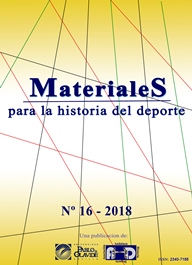The social economy in the sports entrepreneurship in Spain
Keywords:
sport, social economy, cooperative, entrepreneurship.Abstract
Within the social economy, defined in Spain through Law 5/2011, March 29th, of Social Economy, fails the cooperative form. Cooperatives are characterized by being societies formed by associated people, in a free adhesion and voluntary resignation regime, under a democratic system for the conduction of business activities aimed at satisfying the economic and social needs of its members. In entrepreneurship, one of the key aspects is the choice of a legal figure aligned with the needs of entrepreneurs, their objectives and values. Taking into account that the cooperative is presented as a valid legal form for entrepreneurship, the aim of this research was to analyse the existence of a social economy in the Spanish sports field under the cooperative formula. To this purpose, the SABI database was analysed by applying the variables of the National Classification of Economic Activities (CNAE) code, founding year and autonomous community. The applied CNAE codes were those related to the production of sports services. The results indicated a low percentage of commercial organizations registered under the figure of cooperative (0.45%) with a greater presence in the autonomous community of Andalusia. These results are similar to the reality of all the CNAE codes. Further studies are required to analyse in depth the opportunities and barriers of sports cooperatives, as well as sports economic activities that could benefit the most from this entrepreneurship formula.
Downloads
References
Arando, S., Peña, I., y Verheul, I. (2009). Market entry of firms with different legal forms: An empirical test of the influence of institutional factors. International Entrepreneurship and Management Journal, 5(1), 77–95. http://doi.org/10.1007/s11365-008-0094-z
Belmonte-Ureña, L.J., Cortés-García, F.J., y Molina-Moreno, V. (2017). Las cooperativas de crédito y la financiación de los sistemas productivos locales: el caso del sistema productivo agroindustrial de Almería. Respuestas, 22(1), 48-58. https://doi.org/10.22463/0122820X.
Clemente, J., Diaz-Foncea, M., Marcuello, C., y Sanso-Navarro, M. (2012). The wage gap between cooperative and capitalist firms: Evidence from Spain. Annals of Public and Cooperative Economics, 83(3), 337–356.
Comisión Europea. (2012). Evolución del empleo y de la situación social en Europa 2012. Madrid: Ministerio de Empleo y Seguridad Social. Centro de Publicaciones.
Comisión Europea. (2015). Emprendimiento social. Mercado Interior y Servicios. Brussels. Retrieved from http://ec.europa.eu/internal_market/publications/docs/sbi-brochure/sbi-brochure-web_es.pdf
Cornforth, C., y Thomas, A. (1990). Cooperative development: Barriers, support structures and cultural factors. Economic and Industrial Democracy, 11, 451–461. http://doi.org/10.1177/0143831X9001100401
García-Fernández, J., Gálvez-Ruíz, P., Bernal-García, A., y Vélez-Colón, P. (2016). El gasto económico en centros de fitness low-cost: Diferencias según fidelidad y carcaterísticas del cliente. SPORT TK. Revista Euroamericana de Ciencias del Deporte, 5, 137-144.
Garteiz-Aurrecoa, J., y Gadea-Soler, E. (2007). Desarrollo Territorial, Participación Y Cooperativismo. Revesco, 92, 132-152.
Harris, A., Stefanson, B., y Fulton, M. (1996). New generation cooperatives and cooperative theory. Journal of Cooperatives, 15, 15–28.
IOE. (2009). Exiting the crisis in the labour markets. Ginebra: IOE.
INE (13 de octubre de 2017). Empresas por provincia y condición jurídica. Recuperado de: http://www.ine.es/jaxiT3/Tabla.htm?t=302
Ley 5/2011, de 29 de marzo, de Economía Social.
Ley 10/1990, de 15 de octubre, del Deporte.
MESS. (2017a). Avance. Resumen situación empresas de economía social y sus trabajadores inscritas en la seguridad social. Madrid: Subdirección General de la Economía General de la Economía Social y de la Responsabilidad Social de las Empresas. Recuperado de: http://www.empleo.gob.es/es/sec_trabajo/ autonomos/economia-soc/EconomiaSocial/estadisticas/SociedadesAltaSSocial/ 2017/3TRIM/AVANCE_TOTAL.pdf
MESS. (2017b). Guía Laboral: El Trabajo por Cuenta Propia o Autónomo y el Trabajo Asociado. Recuperado de: http://www.empleo.gob.es/es/Guia/texto/guia_2/contenidos/guia_2_7_1.htm
Monzón, J. (2006). Economía Social y conceptos afines: fronteras borrosas y ambigüedades conceptuales del Te rcer Sector. CIRIEC-España, Revista de Economía Pública, Social Y Cooperativa, 56, 9–24.
Monzón, J., y Chaves, R. (2008). The European social economy: Concept and dimensions of the third sector. Annals of Public and Cooperative Economics, 79(3–4), 549–577. http://doi.org/10.1111/j.1467-8292.2008.00370.x
Monzón, J., y Chaves, R. (2012). The Social Economy in the European Union. Retrieved from http://www.eesc.europa.eu/resources/docs/qe-30-12-790-en-c.pdf
Moulaert, F., y Ailenei, O. (2005). Social economy, third sector and solidarity relations: A conceptual synthesis from history to present. Urban Studies, 42(11), 2037–2053.
Puig, N., García, O., y López, C. (1999). Sports clubs in Spain. In Heinemann, K. (Ed.). Sports clubs in various European Countries. New York: Schattauer.
Downloads
Published
Issue
Section
License
Authors who submit to this journal agree to the following terms:
- Author(s) keep copyright and guarantee to the journal the right to be the first publication of the work as licensed under Creative Commons Attribution-Noncommercial-ShareAlike 4.0 International as initial publication in this journal.
- Author(s) can establish additional agreements for non-exclusive distribution of the version of the work published in the journal (for example, to an institutional archives or to publish it in a book), with an acknowledgment of its initial publication in this journal.
- It is allowed and authors are encouraged to disseminate their work electronically (e.g, in institutional open archives or on their own website) before and during the submission process, as it can lead to productive exchanges, as well as a citation earlier and more of published work (See the Effect of Open Access).












